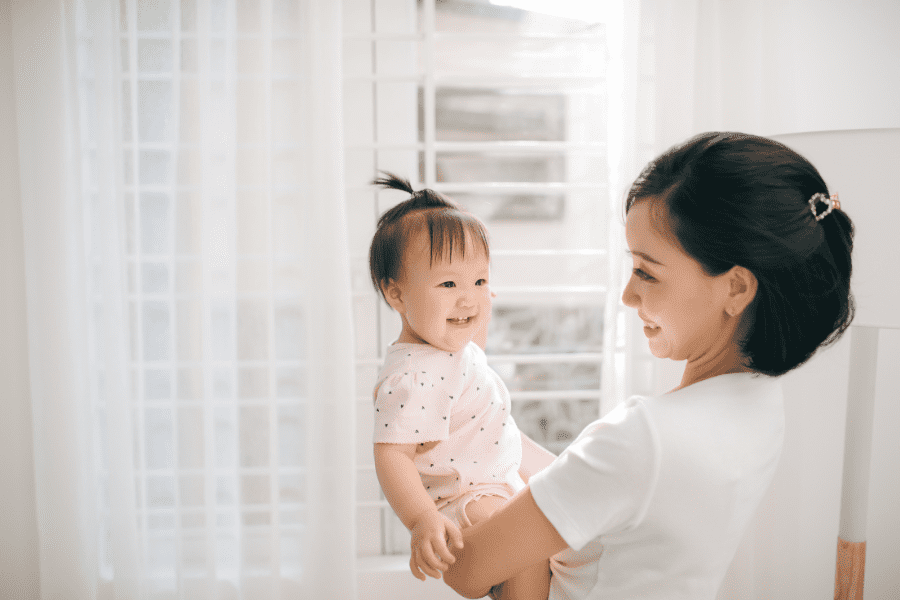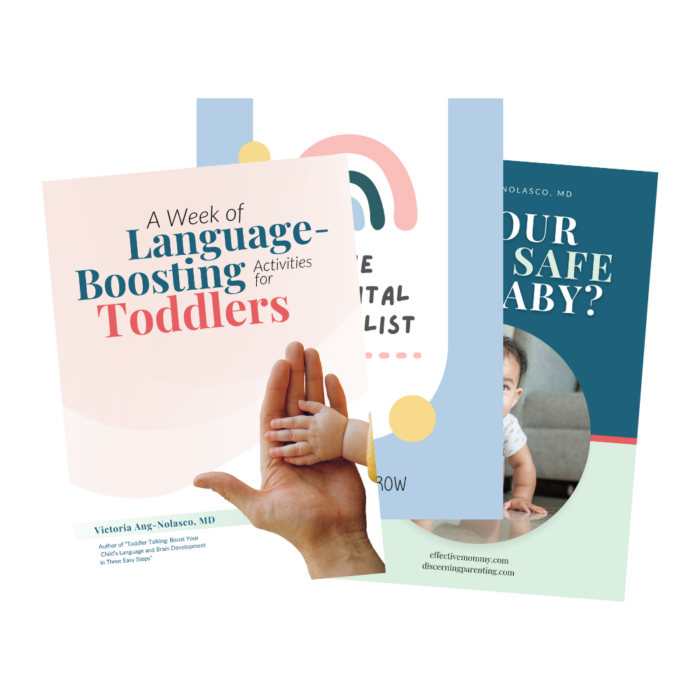Baby’s First Words: At What Age Should They Come?
Are you excited to hear your baby’s first words? When should babies start talking?
In this podcast episode, I talk about the most common myth about when babies should start talking – and why this pressure is stressesing parents out. You’ll discover how fun and easy it actually is to help your baby learn those sweet first words.

If you’re listening to this episode then I can assume you’re the parent of a baby. I also assume your days are simply packed from morning till night – and often beyond that! I know how it’s minute-by-minute action and there’s simply not enough time to add one more thing to your day.
But at the same time, you also have questions like – should my baby already be having their first words? Should I be doing anything to make this happen faster?
Don’t worry – you’re not alone in having these questions!
Free RESOURCE LIBRARY
Sign up below and get FREE access to the Discerning Parenting Resource Library!

As a parent, you want the best for your baby. And those first words are a huge milestone in your baby’s development.
So if your baby isn’t saying those first words as quickly as another baby their age, it’s very easy to think “Oh no, am I doing something wrong?” And then spend all night Googling, “When should my baby start talking?!” or asking for advice from parenting groups.
The pressure is real. We all feel it as parents.
That’s why I decided to create this episode, as a developmental and behavioral pediatrician, parent coach, and mom.
By reading this article or listening to the episode, you acknowledge that any information you get from this podcast is for your general guidance only, and must never be considered a substitute for the advice provided by a doctor speech therapist, or other qualified medical professionals who knows your baby specifically.
When do babies say their first words?
To answer this question, let’s look at two types of language milestones that we look for when we see babies in the clinic.
These two types of language milestones are receptive and expressive language.
Receptive language is how well your baby understands what he hears.
Expressive language is what your baby says – whether it’s sounds or words.
I want to emphasize these, because baby’s language doesn’t just start when she’s already saying her first words. But her language starts developing long before then.
Does she turn when you call her name? Does she understand words for things and people she sees everyday – like mommy, ball, or cup? Does she follow simple commands like, “Come here”? These are all part of receptive language.
Also, your baby prepares to say those first words even months before they come!
During the newborn period, your baby communicated by crying. Babies cry when they are hungry, tired, or uncomfortable. Sometime in the second month, your baby started to make sounds other than crying. These sounds consisted mostly of vowels – this is called cooing. This is what cooing sounds like – (insert clip)
At around 4-6 months old, your baby started to babble, or make sounds that include both vowels and consonants. This is what babbling sounds like –
At this stage, your baby probably also blows raspberries. Your baby’s doing this to not just to be cute. But she’s also practicing the lip and tongue movements that are needed for talking!
Gradually, what your baby says will start sounding like language, but the words won’t be that clear yet. Many parents describe this by saying, “He sounds like he’s speaking in a foreign language!” This is called jargoning. Your baby will use plenty of gestures too- like stretching arms to be picked up or waving bye bye!
Then, most babies will say their first word at around the time of their first birthday – and from then on, you’ll see your baby’s language skills exploding.
So most babies say their first words by the time they’re a year old. But this doesn’t mean that babies don’t communicate with us before then!
How can we help babies learn to say their first words?
Baby’s language development is one of the topics where there’s a lot of noise and mixed messages.
If you look at what the internet is saying about “baby’s first words”, you’re given all these word lists that you’re supposed to teach your baby. Because of this, many parents get stressed out and they feel they need to buy flash cards and do word drills with babies and young toddlers.
If you’ve been trying these drills and these word lists and they’re stressing you out, if they’re not working for you, it’s not your fault. This is the most common myth I see about when babies start talking – the myth that we should hurry this along by following lesson plans or teaching word lists.
But that’s not what learning those amazing first words is all about! That’s why today, I want to remove this stress and guilt for you. I am giving you permission to You can stop doing this.
Your 10 or 12 month old does not need those word drills. You can keep those flashcards on the back shelf for now. You can stop feeling guilty when you see that ad for the baby curriculum pop up on your Facebook feed but you simply have no time to add that to your already busy day.
The thing with all these lessons is – not only are they harder to do – but in the process of trying to get these done, we end up missing out on what baby actually needs. And what’s that? Loving and spontaneous interaction in everyday activities.
Do this right after listening to the episode or reading this article. Ditch all the things that the internet has been telling you to do. Instead, spend 10 minutes just being with your baby. Look at your baby.
Hear the sounds she makes.
Then notice these things-
Does your baby look at you?
Babble?
Or look at something?
These are all your baby’s way of communicating even before they can talk.
Notice it and comment on it! Then pause, and wait for your baby to say something back. These are what researchers call serve and return interactions, and they are absolutely essential to your baby’s brain development.
Another way to enhance speech learning without having set times everyday is to simply talk with your child in everyday situations. Do this while you are giving him a bath, during your meals, when something happens. “Oh, look at that cat that just passed by outside our window!” “You spilled your drink! That’s OK. We will clean it up.”
What’s great about this is it doesn’t take any extra time! These are things you’re already doing anyway – just verbally decribe the steps when you’re doing them, and allow time for your baby to respond.
This is how babies learn – through meaningful situations. And through their relationship with you.
Not only does this help your baby learn their first words, but it’s actually the foundation of their brain development.
I want to share the story of one of the moms I’ve worked with. She says, “Thank you for telling me not to force my child to memorize ABCs or word lists. We just focused on serve and return interactions. SAnd surprisingly, he just picked up the words on his own! Most importantly, he’s so good with everyday conversation. He understands the words and uses them correctly.”
Now if your baby is already a year old and is not saying any words yet – not even mama – you’ll need to discuss this with your pediatrician. It’s not true that we should wait until a child is two, or wait until the child is about to go to school, before a child can get help with their language development if needed.
Next Steps
If you enjoyed this episode and want to know more, get my book “Toddler Talking: Boost Your Child’s Language and Brain Development in Three Easy Steps”.
In this book, I walk you through how to boost your baby’s language development – I start from birth onwards – in a way that’s easy and practical for us as busy parents, and best of all it’s backed by science.
The book has play activities and quick-win strategies you can implement without having to carve out a chunk of time in your day to “do lessons”. Go to toddler-talking.com to find out more.

